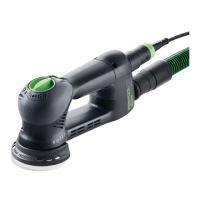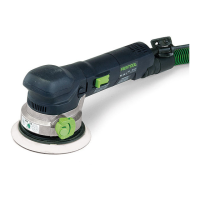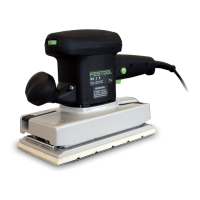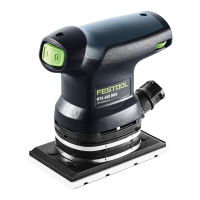Supplemental Owner’s Manual 9
Non-Woven Fiber, Vlies (pronounced eece) is a special
abrasive pad of a non-woven ber impregnated with abra-
sive into the ber. The exible ber mesh and 3-dimensional
abrasive make these ideal for polishing nishes and metal
surfaces.
Choosing the Appropriate Grit
Selecting the best sanding grit for a task is fairly subjective
and depends on the task and even the sanding mode of the
sander. The adage of working progressively up through the
grits is based on the principle of each ner grit removing the
scratches that the coarser grit leaves behind.
For initial stages of sanding with a coarse grit, the goal is
to level the surface. With this comes the trade off between
speed versus deeper scratches. The key is to choose the
nest of the coarse grits that will provide the leveling in a
reasonable amount of time and effort. Choosing too coarse
of a grit may actually increase the amount of sanding later
to remove excess scratching. The Rotex line of sanders
provide the added benet of gear-driven mode, which can
remove material quickly with a less-coarse grit. Therefore,
before switching to a ner grit, rst switch the sander back
to random orbital mode to help reduce the scratches with
the same grit that created them. Then you can progress
through the grits normally or switching between modes.
The purpose of ne sanding is the removal of previous
scratches. The key here is to sand only up to the nest
grit necessary for the desired nish type. The nal grit size
should be commensurate with the grain or structure size of
the material being sanded. Metals, plastics, and nishes; for
example, have a very ne structure and may be sanded to
a ner grit. Wood, on the other hand, has a relatively large
grain structure and should not be sanded beyond a medium
grit unless a burnished nished is desired. (Burnishing tends
to close the wood pores and reduces the absorption of stains
and nishes.)
In summary, you should avoid starting too coarse or nish-
ing too ne for the particular material or surface type.
Best Sandpaper for the Task
Name Type Range Description
► Aluminum Oxide
► e-Wt Paper
► Synthetic Resin
► Closed-coat
P40-P220 The heavy weight paper backing and strong top bond make this
sandpaper very good for long lasting use on bare wood, metal, and
auto body llers.
► Aluminum Oxide
► Synthetic Resin
► Closed-coat
P40-P1500 The non-wax stearated coating and lighter paper weight make this
a very good universal sandpaper for nished and unnished wood,
metal, plastic, solid surface, and composite materials. The high
density closed coat grit is more uniform for reduced scratches.
► Aluminum Oxide
► Synthetic Resin
► Closed-coat
P40-P400 The lighter weight paper and thinner top bond results in shallower
scratches for good sanding results in harder woods, nishes, and
paints. The open-leveled top bond and anti-static coating loads less
when sanding nishes.
► Aluminum Oxide
► Cloth-backing
► Semi-close Coat
► Closed-leveled
P24-P100 The cloth-backing, semi-closed coating, and closed-leveled bond
make these disks very durable workhorses for sanding and leveling
on hard wood, metal, berglass, and reinforced plastics.
► Aluminum Oxide
► Phenolic Resin
► Open-coat
P40-P120 The broad open-coat dispersion of this disk makes it ideal for
aggressive sanding without loading on clog-prone materials, such
as paint stripping or high-resin woods.
► Aluminum Oxide
► Synthetic Resin
► Latex Base Bond
► Semi-close Coat
P40-P3000 The latex base bond provides greater exibility of the grit coating,
which makes Titan idea for polishing tasks on solid surface, plas-
tics, and nishes. The semi-closed coat and open-leveled top bond
result in ner sanding with fewer scratches. However, with the
stearate coating, it is not recommended for water borne nishes.
► Silicon Carbide
► Synthetic Resin
► Open Coated
► Foam
S400-S4000 The tight woven grit base and foam backing makes Platin ideal
for a high gloss surface in plastic, solid surface, and nishes. The
permeable foam and ber results in consistent dust extraction
across the whole disk and cooler surface temperatures.
► Al-Ox or Si-Carb
► Synthetic Resin
► Stearate Si-C
A120-A800 The elastic ber mat with impregnated grit makes Vlies ideal for
deep pore cleaning of woods and scouring or de-rusting of metals.
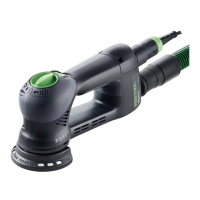
